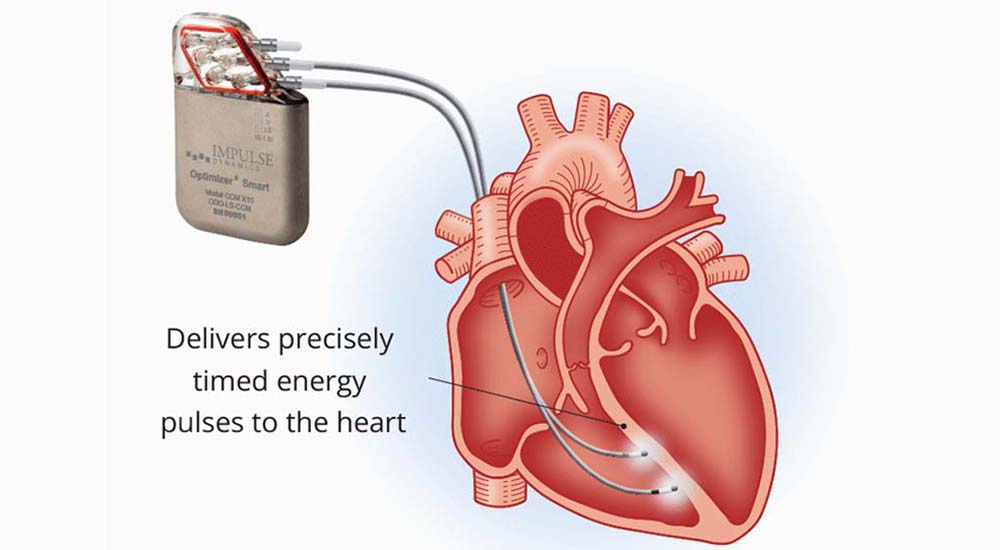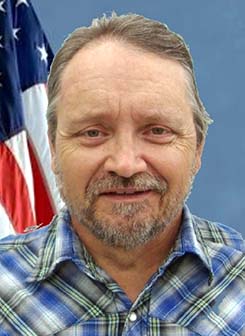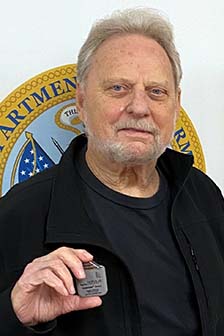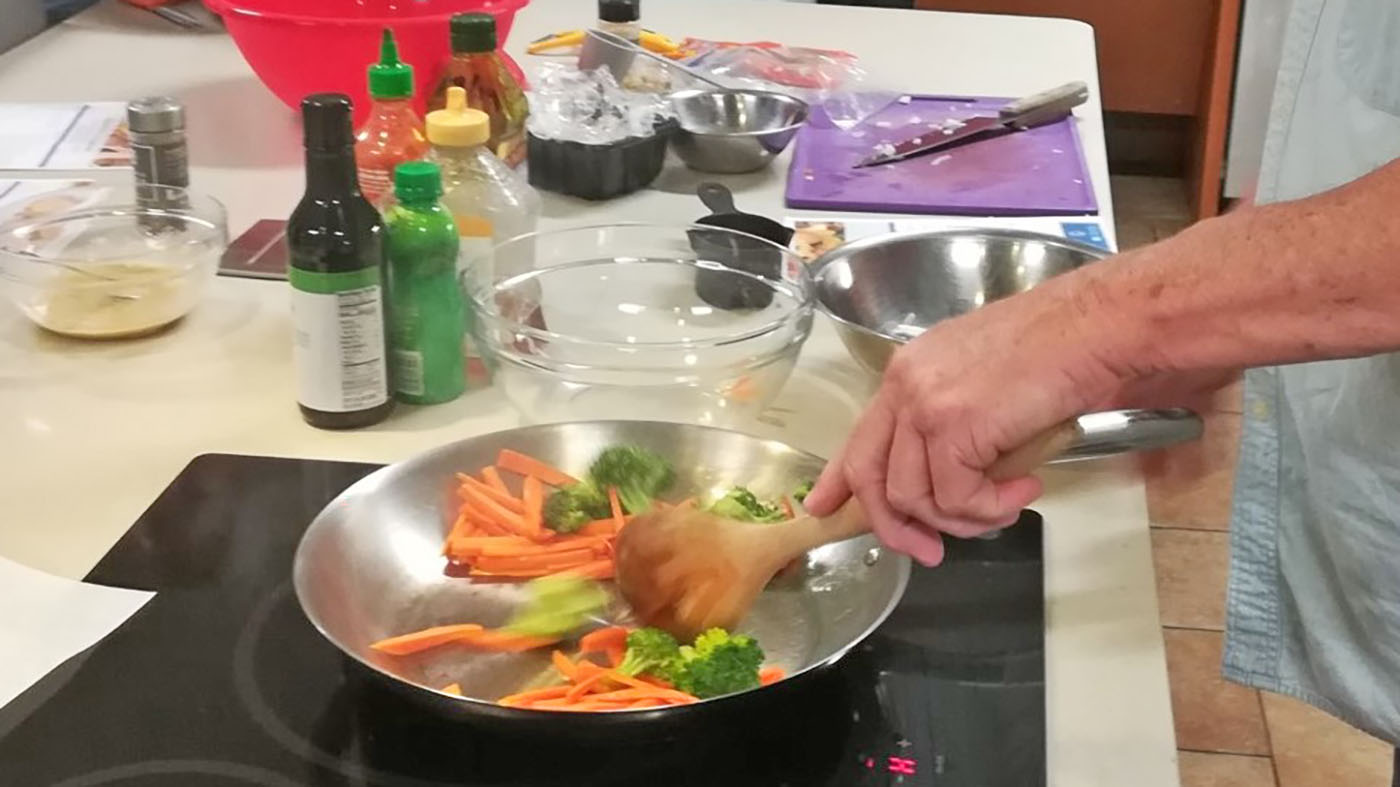After seven years of struggling with chronic heart failure, Veteran Michael Clayton is now literally up and running thanks to an innovative new procedure he received at the Michael E. DeBakey VA in Houston.
Clayton was the first VA patient in the country to undergo a new FDA-approved heart failure treatment called Cardiac Contractility Modulation (CCM) therapy. As a result, his heart is beating stronger, he has more energy and he’s able to work as a substitute teacher.
“Before getting this new procedure, I had trouble staying awake,” said Clayton, a Persian Gulf-era Veteran from Alvin, Texas. “Now I am back to work and exercising regularly. I feel like I’ve been given my life back.”
Clayton, 54, served two tours in Iraq in the Navy. After serving six more years in the Army National Guard, he worked as a truck driver when he had a heart attack in 2014. He came to Houston VA for lifesaving treatment but struggled with fatigue and lack of energy related to heart failure ever since.
When his VA doctors suggested he may be a candidate for CCM therapy, Clayton was immediately on board. He noticed a huge difference within days of the procedure.
“The difference between daylight and darkness.”
“After having this surgery, I felt better both physically and mentally,” he said. “My energy level has improved and I can think so much more clearly. It’s like the difference between daylight and darkness.”
Heart failure is a progressive condition in which the heart slowly weakens and is not able to adequately supply oxygen-rich blood to the body. According to the American Heart Association, about 6.5 million Americans struggle with heart failure. Obesity and diabetes are key risk factors and the number is projected to increase significantly over the next decade.
“Even with optimal guideline-directed medication, heart failure patients often still experience debilitating symptoms, like breathlessness and fatigue that make everyday activities challenging. It can significantly diminish their quality of life,” said Dr. Glenn Levine, Houston VA chief of Cardiology and Baylor College of Medicine professor.
CCM therapy, which involves minimally invasive surgery to implant a device into the heart, works by delivering precisely timed electrical pulses that allow more oxygen-rich blood to reach the body. While somewhat similar in size and basic design to a pacemaker, CCM therapy is different in that it acts on the strength of the heart’s contractions rather than its rhythm.
Device strengthens heartbeat over time
The device’s pulses, delivered in one-hour intervals five times a day, make changes to heart muscle at the cellular level, strengthening the heartbeat over time and reducing symptoms including fatigue and shortness of breath.
Army Veteran Kenneth Beam also underwent CCM therapy at Houston VA with similarly positive results. After surviving a bout of cancer a few years ago, Beam began experiencing symptoms of heart failure and made a cardiology appointment. As he was walking into the cardiology clinic for his appointment, he collapsed. VA staff rushed to his aid.
“The cancer did damage to my heart and I just couldn’t breathe,” he said. “They called a Code Blue on me and saved my life.” Upon being discharged from the VA hospital after a few days, Beam continued to struggle with shortness of breath, fatigue and lack of energy related to heart failure. Then he had CCM therapy.
“I already feel amazing.”
“Before I got this procedure, it was hard to breathe and I had to use my nebulizer four times a day,” said Beam, a Vietnam-era Veteran from LaPorte, Texas. “In just a few weeks, I already feel amazing. My doctors tell me I will get better and better every day. I can’t wait to get back out and ride my motorcycle again.”
Dr. Hamid Afshar is an electrophysiology cardiologist and Baylor College of Medicine professor. He was thrilled to be one of the Houston VA doctors who performed the new CCM therapy on both Veterans.
“This new treatment can significantly improve our Veterans’ quality of life,” Afshar said. “Seeing Mr. Clayton and Mr. Beam both getting around so much better after undergoing this procedure has been heartwarming for all of our staff. It’s an excellent result.”
CCM therapy improves the contraction of the heart. It can be used in conjunction with medications and other heart failure therapies.
Topics in this story
More Stories
VA promotes early nutrition intervention for chronic kidney disease with targeted programs like Heathier Kidneys Through Your Kitchen.
VA Research Advisory Committee on Gulf War Veterans’ Illnesses hosting Veteran Engagement Sessions in Phoenix for 1990-91 Gulf War Veterans.
Navy Veteran and president of the American Medical Association got a colonoscopy and encourages other Veterans to do the same.









The comment from “nope” should be removed. I understand that they may have a gripe with the VA, but the comment provides no useful information on what he may be complaining about. Many medications are poisons by design and are only useful because they affect the treated condition more than the overall health of the individual. Being a cancer patient, I can testify to this type of treatment. The alternative was a near term death due to my cancer. The treatment was difficult and cost me 47 days in hospital and some weeks of recovery. That was five years ago and I am still here.
I have my own complaints about the VA system, but it provided me with one medication that would have cost me over $10,000 per month and many other medications that would not have been cheap.
Do not trust the VA. They will poison you. They will over medicate you. Their medical tech is bottom shelf and will leave you ruined. Most of all, they don’t care. Only you do. Take control and don’t do whatever these quacks recommend. They talk alot about informed consent, but it’s all bullsht.
Could I be eligible for this program
how would that work or effect my defibrillator / pacemaker I already have installed